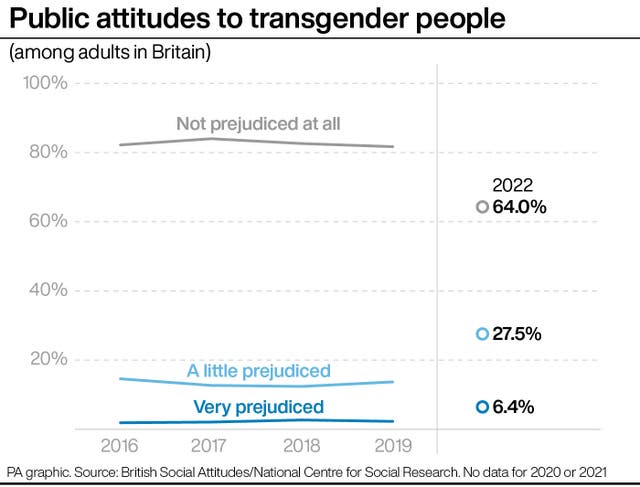
The proportion of the public who think a transgender person should be allowed to change the sex on their birth certificate has fallen from more than half to less than a third in recent years, according to a major survey.
The percentage of people characterising themselves as “not at all prejudiced” against transgender people also fell, from 82% to 64% since 2019.
Some 3,378 adults in Great Britain were interviewed in September and October last year for this section of the wide-ranging British Social Attitudes (BSA) report.
 (PA Graphics)
(PA Graphics)
The research, published by the National Centre for Social Research (NatCen), found that the proportion thinking someone who is transgender should be allowed to have the sex recorded on their birth certificate changed if they want has fallen from 53% in 2019 to 30% in 2022.
While the BSA has run for 40 years, the questions on attitudes around transgender people were first asked in 2016.
READ MORE: Court battle over Holyrood gender reform ends day early
Looking at how attitudes have changed in the past few years since 2019, the survey found that the proportion of people describing themselves as “a little prejudiced” against people who are transgender rose from 13.7% to 27.5% in 2022, while those saying they were “very prejudiced” rose from 2.3% in 2019 to 6.4% last year.
Gillian Prior, deputy chief executive at NatCen, said: “In the case of transgender people, the recent public debate about the law on gender recognition has appeared to have resulted in attitudes becoming less liberal than they were just a few short years ago.”
The Scottish Government is currently seeking to challenge the UK Government’s use of powers under Section 35 of the Scotland Act, which have prevented the Gender Recognition Reform (Scotland) Bill passed by Holyrood from gaining royal assent.
 Prime Minister Rishi Sunak has previously said that ‘biological sex is fundamentally important’ (PA)
Prime Minister Rishi Sunak has previously said that ‘biological sex is fundamentally important’ (PA)
The reforms aim to make it easier for trans people to self-identify and obtain a gender recognition certificate without the need for a medical diagnosis of gender dysphoria.
The UK Labour party’s approach is at odds with Scottish Labour, after Sir Keir Starmer’s party rowed back on plans to introduce a self-ID system for transgender people.
Speaking in July, Sir Keir said such a system to allow gender ID without a medical diagnosis is not the “right way forward”.
READ MORE: Gender recognition reform court case explained in five
His words followed the party’s shadow women and equalities secretary Anneliese Dodds arguing in an article in The Guardian that a medical diagnosis “upholds legitimacy of applications and confidence in the system”.
UK Prime Minister Rishi Sunak has previously said that “biological sex is fundamentally important”, with the Westminster Government asking the Equalities and Human Rights Commission (EHRC) about changing the Equality Act to refer to “biological sex”.
The EHRC concluded in April that while it found “no straightforward balance”, the change could bring “greater legal clarity” in eight areas, including hospital wards and sports.



Why are you making commenting on The Herald only available to subscribers?
It should have been a safe space for informed debate, somewhere for readers to discuss issues around the biggest stories of the day, but all too often the below the line comments on most websites have become bogged down by off-topic discussions and abuse.
heraldscotland.com is tackling this problem by allowing only subscribers to comment.
We are doing this to improve the experience for our loyal readers and we believe it will reduce the ability of trolls and troublemakers, who occasionally find their way onto our site, to abuse our journalists and readers. We also hope it will help the comments section fulfil its promise as a part of Scotland's conversation with itself.
We are lucky at The Herald. We are read by an informed, educated readership who can add their knowledge and insights to our stories.
That is invaluable.
We are making the subscriber-only change to support our valued readers, who tell us they don't want the site cluttered up with irrelevant comments, untruths and abuse.
In the past, the journalist’s job was to collect and distribute information to the audience. Technology means that readers can shape a discussion. We look forward to hearing from you on heraldscotland.com
Comments & Moderation
Readers’ comments: You are personally liable for the content of any comments you upload to this website, so please act responsibly. We do not pre-moderate or monitor readers’ comments appearing on our websites, but we do post-moderate in response to complaints we receive or otherwise when a potential problem comes to our attention. You can make a complaint by using the ‘report this post’ link . We may then apply our discretion under the user terms to amend or delete comments.
Post moderation is undertaken full-time 9am-6pm on weekdays, and on a part-time basis outwith those hours.
Read the rules hereLast Updated:
Report this comment Cancel